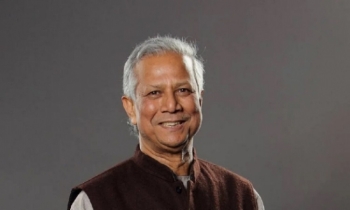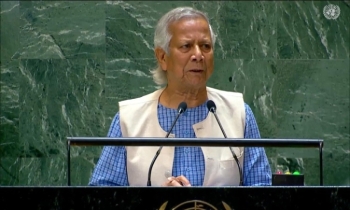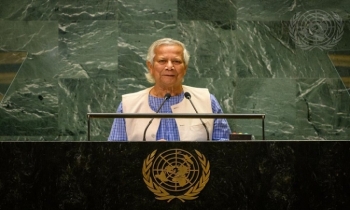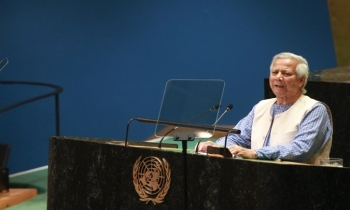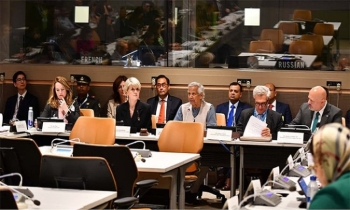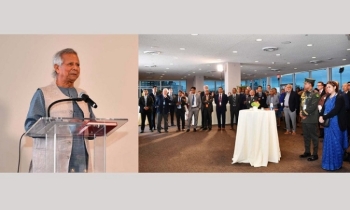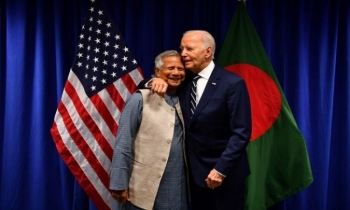Water now a strategic asset: ActionAid
BI Report || BusinessInsider

Photo: Courtesy
As rivers influence geopolitics in South Asia, water is now treated as a strategic asset, not only as a resource, said speakers at a conference.
The 7th International Water Conference 2022’ titled ‘Teesta River Basin: Overcoming the Challenges’ was organised by ActionAid Bangladesh, said a press release.
At the conference’s second day, Shahidul Haque, Professorial Fellow, NSU, and former Foreign Secretary of Bangladesh, said geopolitics is a tool to analyse in the context of political views and national interest.
He also remarked that geopolitics should not be seen as zero-sum game. It should be win-win situation looking through the geopolitical lens.
The second day of the conference focused on the thematic issues- Structural Interventions and Regional Geo-politics around Teesta River Basin and Teesta River Basin and its Ecosystem and Gender Implications.
Urging for a basin wise water management system, parliament member Hasanul Haq Inu said, barrages and dams are affecting the eco system.
In this conference, Jayanta Basu, Environment Documentation Expert, Director of Environment Governed Integrated Organisation (EnGIO), Faculty, Calcutta University, presented a paper titled ‘Geopolitics of River Teesta and need to pursue Nature based Negotiated Approach (NBNA)’.
According to his paper presentation, South Asian trans boundary river issues are linked to regional geopolitics as all countries in the region strongly depend on rivers mainly for agriculture, hydroelectricity & other reasons. Unequal political power positioning in the region; the influence of international, national, and local political relationships river and climate change are the vital factors in regional geopolitics.
He stated that upper riparian vs lower riparian country narrative does not hold water in such a dynamic water sharing paradigm and proposed for the holistic inter-country stakeholder level discussion to arrive at a comprehensive trans-boundary river water usage model.
“Between India and Bangladesh, there is no holistic basin-based approach although both countries share 54 trans boundary rivers. A holistic basin-based approach is needed to be taken”, said, Jayanta Basu.
Basu also said that Nature Based Negotiated Approach (NBNA) to Integrated River Basin Management (IRBM) is key in addressing the conflicts like Teesta.
Keeping agriculture and food security at centre, Dr Atiq Rahman Executive Director, Bangladesh Centre for Advanced Studies (BCAS), said that restricting the flow of water by the barrage and holding
can disrupt the life and livelihood of the river-based people. He also said that West Bengal and Bangladesh are fortunate to have good civil society organisations that can act as a catalyst to mitigate any conflicting issues like Teesta river water.
Terming rivers as a living entity, Syeda Rizwana Hasan Chief Executive, Bangladesh Environmental Lawyers Association (BELA) said, this value is totally lost in India Bangladesh negotiation and decision-making process. She said that the nature-based negotiation approach is missing, and the negotiation process should be accountable and transparent regarding the water management and allocation.
management has to be basin wise management starting from the origin and down to the point where river reaches to the ocean”, Rizwana added.
As per the rule, the joint river commission between Bangladesh and India has to be sat twice in a year but the real scenario is different and no fruitful outcome is visible, said Sharif Jamil General Secretary, Bangladesh Poribesh Andolon (BAPA).
He also said, “the entire river system among Ganges, Brahmaputra and Meghna should be looked at holistically and five riparian countries should sit together and managed this entire three basins because this is an integral part of single river system.”
Noting that the Teesta river is associated with 25 rivers in Bangladesh, Tuhin Wadud Professor, Begum Rokeya University, Director, Riverine People, said, “No decision should be taken on the Teesta without consulting the people on the banks of the river”.
He added that each river has its own characteristics. When it comes to adopting any master plan for the river, it is important to keep in mind about the people and the environment along the river.
Another paper titled ‘Living with the Teesta River: women's livelihoods strategies in the changing climate of the Teesta River basin’ was presented by Zarin Yesmin Chaity, Assistant Professor at Gender and Development Studies, Begum Rokeya University.
From historical, cultural and socio-economic perspectives, women share a strong and significant bonding with the river and are dependent on the river for their survival, said Zarin Yesmin Chaity.
This study found that, women of the Teesta river basin are being engaged in new cropping systems, alternative livelihood strategies, and disaster preparedness that empowering them as well uplifting their living standard.
She also said that women now are not vulnerable or submissive, rather became survivor and saviour for the family and bringing positive changes. They are now involved with income generating activities and earning money.
Ajaya Dixit, Advisor, ISET-Nepal; Sharmind Neelormi, Professor, Jahangirnagar University; Minket Lepcha, Storyteller, Filmmaker, Independent Researcher; Dr Mahbuba Nasreen, Professor & Director, Institute of Disaster Management and Vulnerability Studies, University of Dhaka; Shahnaz Parvin, Project Coordinator, Gana Unnayan Kendra (GUK) also spoke in the second day of the conference.
Zehrin Ahmed, Communications Coordinator at Bangladesh, Youth Environmental Initiative (BYEI); Chhaya Namchu, Affiliated with West Bengal Lepcha Development board, Mayalmith Lepcha, General secretary of Affected citizens of Teesta (ACT) also shared their thoughts from grassroots.


